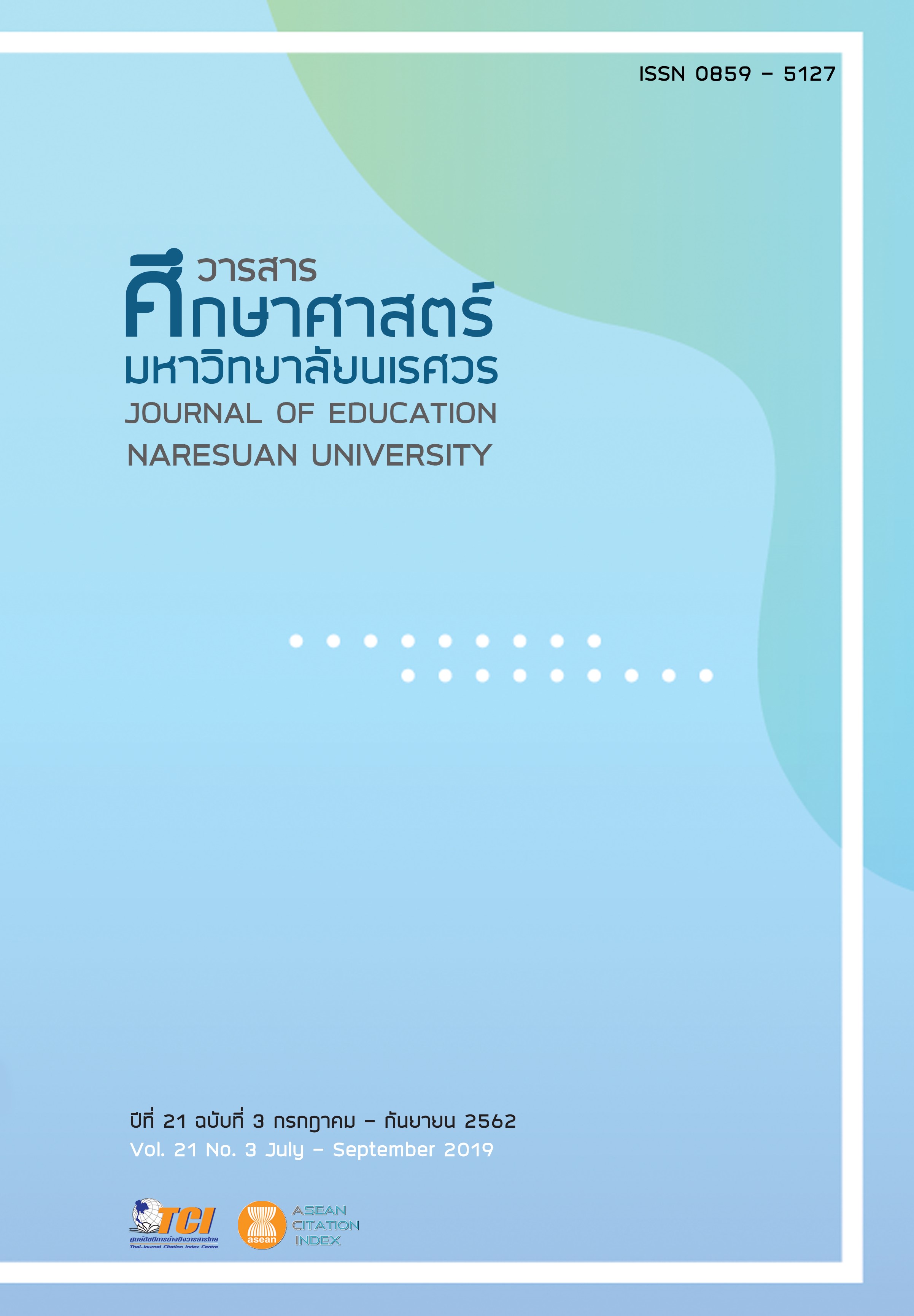ผลการจัดกิจกรรมการเรียนรู้ตามกระบวนการคิดให้เป็นคณิตศาสตร์ที่มีต่อทักษะการคิดเชิงคณิตศาสตร์ ของนักเรียนชั้นมัธยมศึกษาปีที่ 1 (THE EFFECTS OF USING LEARNING ACTIVITY ON MATHEMATIZING PROCESS UPON MATHEMATICAL THINKING SKILLS OF GRADE 7 STUDENTS)
Main Article Content
Abstract
การวิจัยครั้งนี้มีวัตถุประสงค์ 1) เพื่อศึกษาทักษะการคิดเชิงคณิตศาสตร์ระหว่างเรียนของนักเรียนชั้นมัธยมศึกษาปีที่ 1 ที่เรียนด้วยกิจกรรมการเรียนรู้ตามกระบวนการคิดให้เป็นคณิตศาสตร์ 2) เพื่อเปรียบเทียบทักษะการคิดเชิงคณิตศาสตร์ของนักเรียน หลังเรียนด้วยกิจกรรมการเรียนรู้ตามกระบวนการคิดให้เป็นคณิตศาสตร์ เทียบกับเกณฑ์ร้อยละ 70 ที่ระดับนัยสำคัญ .05 กลุ่มตัวอย่าง คือ นักเรียนชั้นมัธยมศึกษาปีที่ 1 โรงเรียนจ่านกร้อง จังหวัดพิษณุโลก ที่กำลังศึกษาในภาคเรียนที่ 2 ปีการศึกษา 2559 จำนวน 27 คน ที่ได้มาด้วยวิธีการสุ่มตัวอย่างแบบกลุ่ม เครื่องมือที่ใช้ในการวิจัย ได้แก่ 1) แผนการจัดการเรียนรู้ 2) แบบวัดทักษะการคิดเชิงคณิตศาสตร์ สถิติที่ใช้ในการวิเคราะห์ข้อมูล คือ ร้อยละ ค่าเฉลี่ย ส่วนเบี่ยงเบนมาตรฐาน และค่าทดสอบที ผลการวิจัย พบว่า 1) ทักษะการคิดเชิงคณิตศาสตร์ระหว่างเรียนของนักเรียนเพิ่มขึ้นทั้ง 3 ด้าน 2) ทักษะการคิดเชิงคณิตศาสตร์ของนักเรียนที่ได้รับการจัดกิจกรรมการเรียนรู้ตามกระบวนการคิดให้เป็นคณิตศาสตร์หลังเรียนสูงกว่าเกณฑ์ร้อยละ 70 ที่ระดับนัยสำคัญ .05
THE EFFECTS OF USING LEARNING ACTIVITY ON MATHEMATIZING PROCESS UPON MATHEMATICAL THINKING SKILLS OF GRADE 7 STUDENTS
The purposes of this research were 1) to investigate grade 7th mathematizing process making during learning with the developed mathematical thinking skills, and 2) to compare students’ mathematical thinking skills after being provided with learning activities by using the mathematizing process learning approach with the 70 percent criterion sampling group was students of grade 7th at the second semester of Janokrong School, the second semester of academic year 2017 amount 27 students which were provided with simple random sampling by cluster random sampling. The research instruments were 1) the lesson plans, and 2) the Mathematical thinking test the data obtained were analyzed by using mean, standard deviation, percentage and t-test for one sample. The findings were as followed: 1) all skills in students’ mathematical thinking is increased during studying, and 2) the students’ mathematical thinking skills after being provided with learning activities by mathematizing process learning to enhance the mathematical thinking skills higher than the criterion of 70 percent at the .05 of significance
Article Details
The owner of the article does not copy or violate any of its copyright. If any copyright infringement occurs or prosecution, in any case, the Editorial Board is not involved in all the rights to the owner of the article to be performed.
References
2. Kriegler, S. (2004). Just what is algebraic thinking? Retrieved September 9, 2016, from www.math.ucla.edu/~kriegler/pub/algebrat.html
3. Ministry of Education. (2008). Learning area of mathematics in the basic education core curriculum B.E. 2551 (A.D. 2008). Bangkok: The Agricultural Cooperative Federation of Thailand. [in Thai]
4. OECD. (2009). Mathematical problem solving and differences in students' understanding, learning mathematics for life: A perspective from PISA. Retrieved September 5, 2016, from https://www.oecd.org/pisa/pisaproducts/pisa2003/44203966.pdf
5. Samart, P. (2012). Development of mathematical thinking of eighth grade student by using mathematizing process (Master thesis). Bangkok: Chulalongkorn University. [in Thai]
6. Saiyot, L., & Saiyot, A. (1995). Educational research techniques (5th ed). Bangkok: Suriwattayasan. [in Thai]
7. Srisa-ard, B. (2011). Basic research (9th ed). Bangkok: Suriwattayasan. [in Thai]
8. Yoon, C. (2009). Modelling the height of the antiderivative. Retrieved September 9, 2016, from https://www.merga.net.au/documents/Yoon_RP09.pdf

